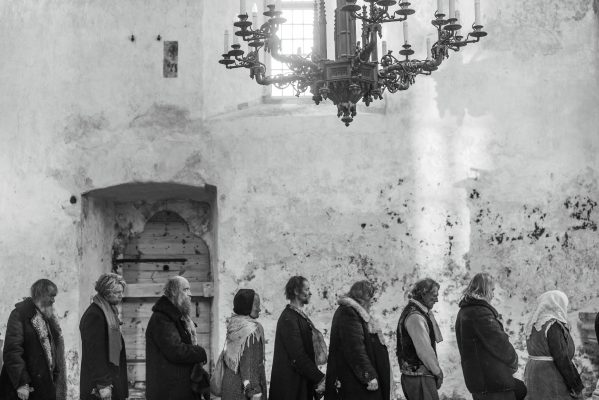Available on dual-format Blu-ray/DVD from Mon 13 May 2019
Even if you’re familiar with the weirdest folk tales of the farthest reaches of Eastern Europe, November is a very strange work indeed. This story of a simple love triangle takes place in a dilapidated Estonian village in which it’s commonplace to chat with dead loved ones, consult the local witch for relationship advice, and store up communion wafers to act as divine bullets when hunting. Rainer Sarnet’s film is bizarre, hypnotic and utterly wonderful.
Peasant girl Liina (Rea Lest) is in love with dopey but good-natured Hans (Jörgen Liik). However, he is instantly entranced by the Baroness (Jette Loona Hermanis), the daughter of a German aristocrat. Both Liina and Hans turn to occult means in an attempt to ensnare the object of their affections. Sadly for both lovers, it seems that love is one of the few forces immune to esoteric meddling.
It’s often said about any film that departs from established templates that they’re like nothing you’ve ever seen, but in the case of November it rings true. There are elements that bring to mind other work. Despite being set in the 19th century, there’s a medieval air of religious instability and superstition as in the more playful moments of The Seventh Seal. There is also the relentless mud, shit and squalor of Aleksey German‘s Hard to be a God, but in terms of mood and visual invention November stands alone.
As a spectacle, it is unbelievably gorgeous throughout. Mart Taniel‘s sparkling black and white cinematography is the match of Lukasz Zal‘s celebrated work in Pawlikowski‘s Ida and Cold War. He captures ethereal snow-scapes and weather-beaten faces in equally stunning detail; equal affection is lavished on the beautiful and grotesque alike.
Sarnet complements Taniel’s eye with a constant stream of indelible imagery that dances with ease between a pervasive eeriness and cheery scatological vulgarity: the deadly kisses of a curiously seductive plague can be avoided by putting trousers on your head. “The plague will think we have two arses and won’t dare to touch us.”
Best of all are the kratts. These workaholic demons are created through a deal with the Devil, from three drops of blood and whatever discarded hay, snow or machinery available. We first see one in the prologue; a clattering tripod composed of scythes and a cow’s skull. The creature flies off into the air with a terrified calf. They will carry out chores, steal things from other villagers at the behest of their masters, and will often turn violently on their creators if they run out of tasks.
Narratively, November is somewhat sparse, and the dreamlike imagery carries much of the weight. This is however pretty much the only criticism that can be levelled at this unique oneiric fable. Every element works in harmony, from the visuals, the natural performances of the mainly non-professional cast, and the doom-laden score from Jacaszek, with sparse, slab-heavy guitar that wouldn’t be out of place on a Sunn O))) album. It’s strange, unsettling and darkly funny all at once. It’s very, very special indeed.
